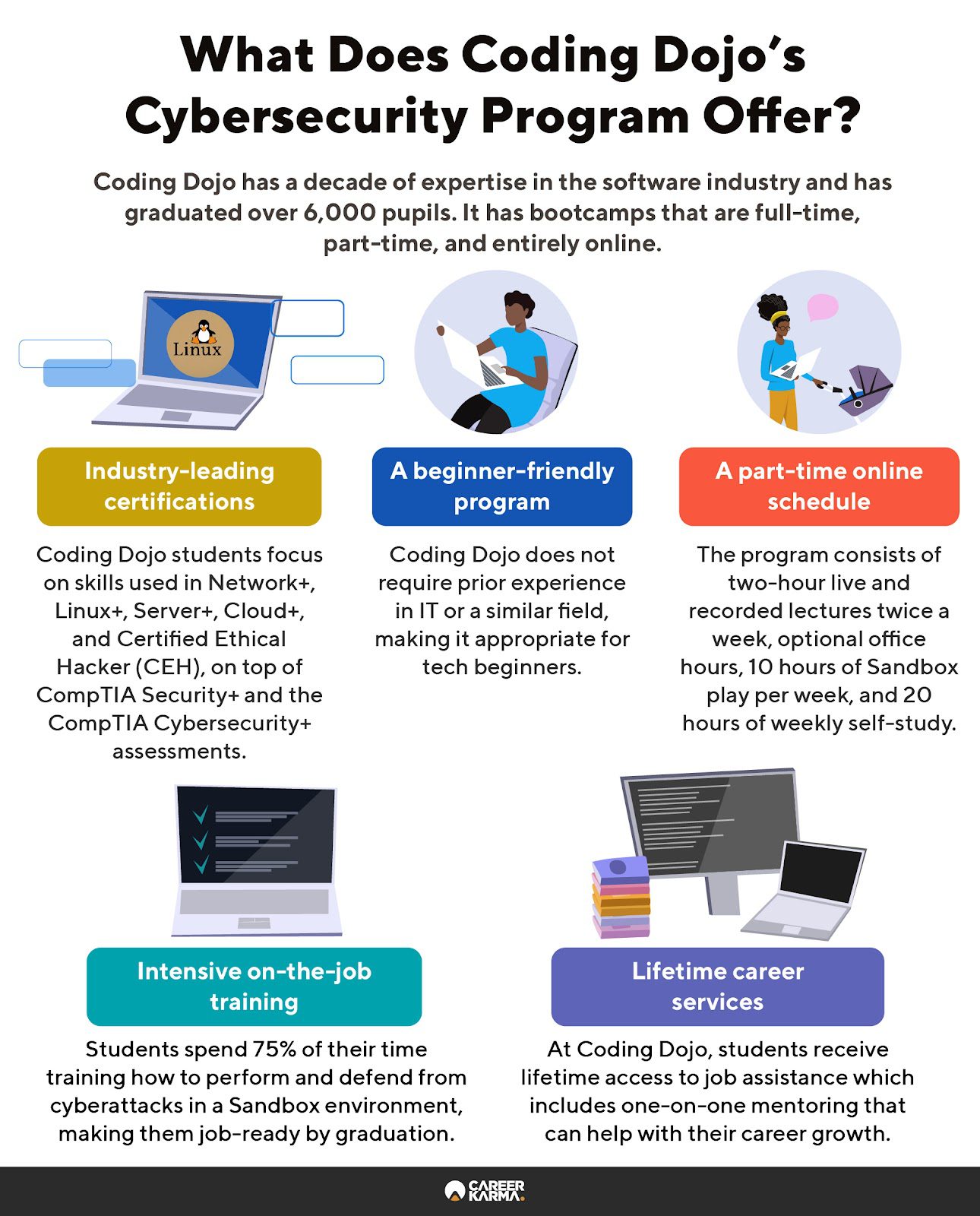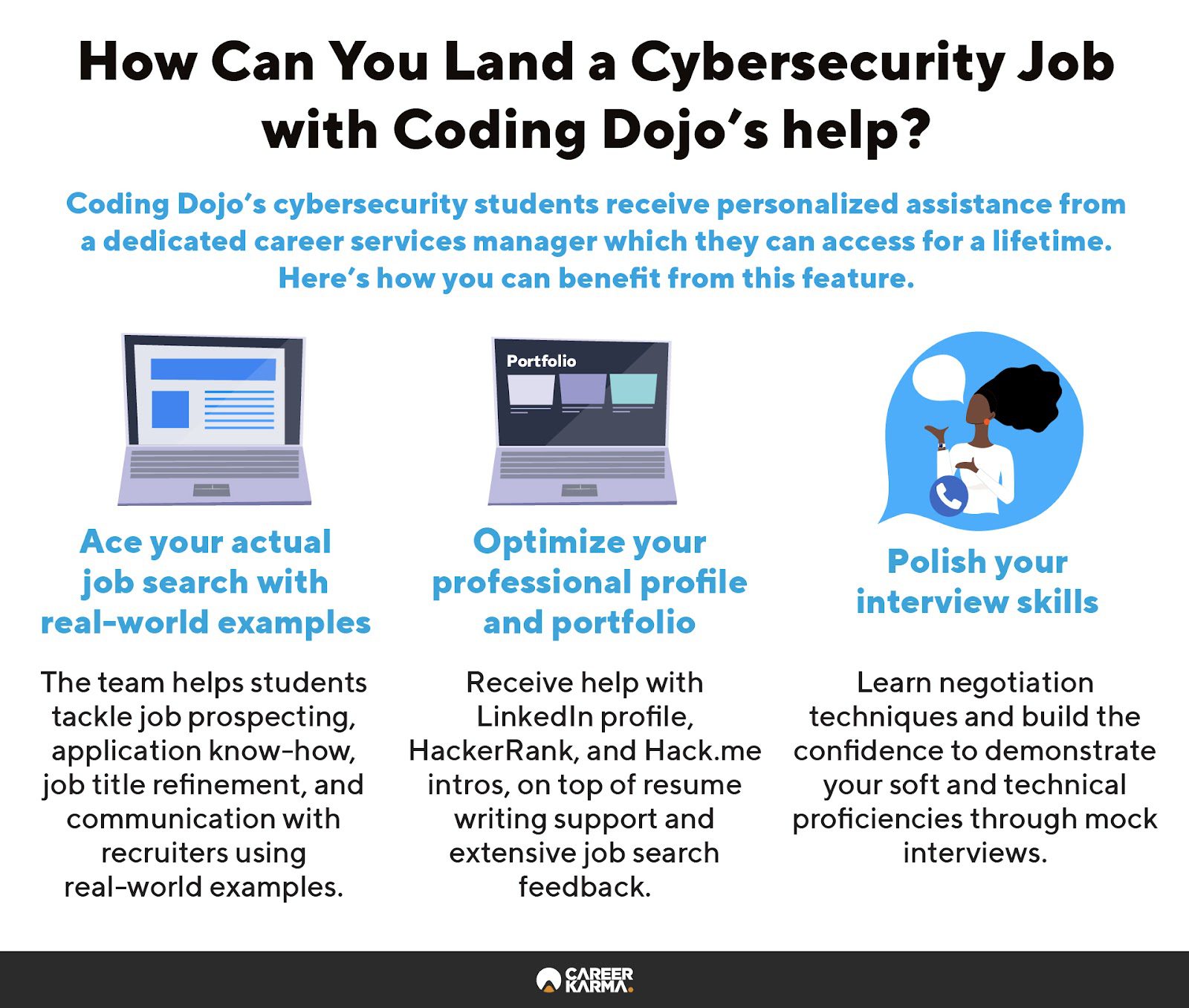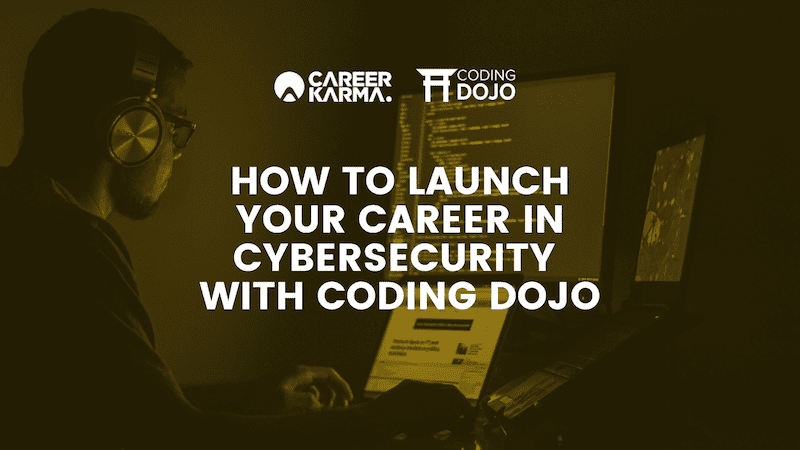The year 2020 became a year of disruption for many, marked by a health crisis, mass unemployment, unprecedented digital adoption, and what others have called the “cyber pandemic”. A year later, while the world slowly adjusts to the new normal, the cyber pandemic rages on with recent cyber attacks threatening industries across the board, from tech giants and insurance providers to public schools and even police departments.
According to Cybersecurity Ventures, if this trend persists, there will be a new ransomware attack every two seconds by 2031, with damages exceeding $265 billion. As the threat to cybersecurity deepens, companies are racing to fill their ranks with skilled professionals who can guard their digital gates.
Working to produce a new breed of cybersecurity professionals is tech bootcamp, Coding Dojo.
Coding Dojo’s 24-week Cybersecurity Online Part-Time Bootcamp offers unique hands-on experience, dedicated lifelong career services, and the knowledge you’ll need to earn top industry certifications.
Sign up for Coding Dojo today.What Is Cybersecurity and Why Work in Cybersecurity?
The Cybersecurity and Infrastructure Security Agency defines cybersecurity as “the art of protecting networks, devices, and data from unauthorized access or criminal use and the practice of ensuring confidentiality, integrity, and availability of information.” As data breaches rise, people all over the world require greater cybersecurity measures to protect their privacy.
This year, companies are pouring in a collective $150.4 billion into spending on security technologies and services. The increased spending has led to a windfall of opportunities for aspiring cybersecurity professionals. According to Cyberseek, the security sector in the US currently only has enough professionals to fill in 68 percent of the demand, with around 590,000 jobs left unfilled.
This high demand also comes with high compensation. According to PayScale, cybersecurity analysts earn $76,955 on average, much higher than the national average across occupations at $48,672.
Put simply, while a job in cybersecurity is challenging due to the onslaught of attacks you’ll have to ward off, it’s rewarding—both in terms of pay and a sense of fulfillment.
Is Cybersecurity Right for Me?
There are various questions you can ask yourself before getting started on your cybersecurity career path. We suggest considering the following:
- Are you interested in protecting your data, defending computer systems, and staying up to date on the latest in cyber protection?
- Do you want to open up to new rewarding, in-demand, and lucrative career opportunities that don’t require a degree?
- Do you want a career with zero percent unemployment?
- Are you willing to undergo an intense training program to make it happen?
If you answered “yes” to all, consider joining Coding Dojo’s Cybersecurity Online Part-Time Bootcamp to launch your career in cybersecurity.
5 Reasons to Enroll in Coding Dojo’s Cybersecurity Program

Coding Dojo has five campuses in the US and offers full-time, part-time, and fully online bootcamps. The school has over 10 years of curriculum experience and has produced over 7,000 graduates. One of the programs offered by Coding Dojo is the 24-week Cybersecurity Online Part-Time Bootcamp.
Train to Earn Top Industry Certifications
Coding Dojo’s cybersecurity bootcamp students learn skills that they can use to earn essential certifications, such as Network+, Linux+, Server+, Cloud+, and Certified Ethical Hacker (CEH). They also obtain free vouchers to take the CompTIA Security+ and CySA+ certification exams.
While many bootcamps teach to the Security+ certification, Coding Dojo is one of the only programs to teach students the skills necessary to pass the CySA+, an intermediate-level certification that commands a higher salary in the job market.
No Professional Experience Required
The cybersecurity bootcamp at Coding Dojo does not require any prior expertise in IT or a related industry, nor will you need a four-year degree to qualify. Unlike many other Cyber programs, the Coding Dojo Cybersecurity program is suitable for beginners.
Ideal for Parents and Working Professionals
Coding Dojo’s cybersecurity program has a part-time, online format. It includes two-hour live and recorded lectures twice a week, optional office hours, 10-hour per week play in the Sandbox environment, and 20 hours per week of self-study. This makes it a good choice for working professionals, parents, and other individuals who simply have no availability to commit to a full-time learning schedule.
Extensive Hands-On Training
Coding Dojo’s Cybersecurity bootcamp provides a balance of thorough offensive and defensive training within the Sandbox setting. Students spend up to 75 percent of their time in labs, as they take turns attacking opposing teams and defending their own in cybersecurity games like Capture the Flag and other exercises. By getting first-hand training, students come out of the bootcamp armed with not just theoretical knowledge but also practical skills.
Comprehensive Career Services
Coding Dojo provides students with lifetime career services, including 1:1 mentor support. Since they can have access to the career services throughout their lifetime, Coding Dojo’s grads can reach out to the school’s career service team at any point during their professional development.
An Overview of Coding Dojo’s Cybersecurity Program Curriculum
Coding Dojo’s cybersecurity program teaches students how to recognize, evaluate, and assess threats to technology and information security. Knowledge, techniques, and tactics for identifying and managing gaps in information systems, devising ways to improve defense measures, and employing effective strategies against attackers are all part of the curriculum.
The cybersecurity program consists of the following phases:
- Precourse (Weeks 2 – 0)
- Core Track (Weeks 1 – 8)
- Intermediate Track (Weeks 9 – 16)
- Professional Track (Weeks 17 – 24)
Precourse
The schedule, stack expectations, certification process, and what is expected of prospective students who graduate from the program are all covered in the two-week precourse. By reading short cybersecurity material and completing assignments, students become familiar with the structure and fundamentals of cybersecurity. Students also set up and run their virtual PCs.
Core Track
Students learn basic understanding in important areas of cybersecurity during the first eight weeks of the program. Students gain experience with a variety of operating systems, gain a better understanding of network architecture, and learn how to spot vulnerabilities.
Intermediate Track
By the end of Week 16, students can show prospective employers some basic security skills, including:
- Building security solutions for apps, networks, and devices
- Performing threat assessments and putting in place appropriate mitigating solutions
- Working with a thorough awareness of relevant security policies
Students are also given a voucher for the Security+ certification exam after passing their first belt exam.
Professional Track
Students should have acquired all of the necessary cybersecurity knowledge and skills by the end of the program, including the ability to build and employ several threat intelligence techniques, perform weakness evaluations, assess information to improve security strategies, evaluate possible signs indicating that a system has been compromised, implement incident response procedures, and conduct a threat search.
The bootcamp concludes with a second belt exam, and students get their voucher for the CompTIA CySA+ certification exam.
How to Pay for Coding Dojo’s Cybersecurity Program
For the online 24-week cybersecurity program, Coding Dojo costs amount to $16,245. Various financing options are available for the students, including the following:
- Upfront Payment. Students can pay for the program in full prior to starting class to save $250 off tuition fees.
- Payment Plans. Various payment plans are available for Coding Dojo students via Miashare, which allows students to spread parts of their tuition over two or six interest-free weekly payments. Custom payment plans are also available.
- Third-Party Loans. While bootcamps are not eligible for federal loans, Coding Dojo offers students a way to take out a loan to finance their education through their partnerships with Climb Credit and Ascent.
Learn more about Coding Dojo’s financing options here.
Career Services for Coding Dojo’s Cybersecurity Program

Coding Dojo offers its students lifetime access to career services. Students get personalized career support from a dedicated cybersecurity career services manager and keep their career service access for life.
Help with a Professional Profile and Portfolio
Coding Dojo’s students receive help with professional profile development. The school’s career services team assists students with creating their LinkedIn, HackerRank, and Hack.Me profiles. During the bootcamp, Coding Dojo’s students also get assistance with resume development and detailed feedback on their job search.
Job Prospecting and Application Guidance
The next step in the job search process is job prospecting and application guidance. Coding Dojo helps students with their job search by providing examples of applications and job title refinement. By the end of the program, students learn how to communicate effectively with hiring managers.
Interview Prep and Salary Negotiation
At the end of the program, Coding Dojo’s students have mock interviews at school that help them prepare for future job interviews. The school also provides technical skill test prep. Additionally, students are trained on how to negotiate job contracts effectively.
Top Career Paths After Coding Dojo’s Cybersecurity Program
Coding Dojo reports an 89.1 percent placement rate within 180 days of graduation, and their placement statistics have been independently verified by an auditing firm. Below are possible roles that you can take after completing Coding Dojo’s cybersecurity bootcamp.
- Cybersecurity specialist
Cybersecurity specialists protect an organization’s hardware, software, and networks from cyber attackers. They need to understand an organization’s IT infrastructure in detail, monitor it constantly, and evaluate potential threats that could breach the network. The average base salary for cybersecurity specialists is $111,052. - Threat intelligence analyst
Threat intelligence analysts protect computer networks and systems by identifying threats through information collection and intelligence analysis. They can work both in the private sector and the government, analyzing threat actors’ tactics, techniques, and procedures. The average base salary for threat intelligence analysts is $100, 324. - Cybersecurity analyst
Cybersecurity analysts plan and carry out security measures to protect an organization’s computer systems and networks. They keep tabs on threats and monitor the organization’s networks for any security breaches. The average base salary for cybersecurity analysts is $76,811. - Systems administrator
Systems administrators are responsible for the day-to-day operation of computer networks. Systems administrators work with the physical computer networks of a variety of organizations and therefore are employed in a wide range of industries. The average base salary for systems administrators is $63,368. - Security administrator
Security administrators control the system as a whole, making sure it is running properly. They are responsible for updating the system, resolving issues, and setting up new users. The average base salary for security administrators is $67,743. - Security specialist
Security specialists have an in-depth understanding of cybersecurity threats, technologies, and countermeasures to ensure secure computer systems. They protect systems against network breaches and educate employers on data security. The average base salary for security specialists is $76,727. - Security engineer
Security engineers specialize in protecting sensitive data. They work for clients or organizations implementing protective measures to keep information secure and taking action in case of a breach to prevent the loss or theft of the information. The average base salary for security engineers is $95,212. - Network administrator
Network administrators install and maintain hardware and software, manage user passwords, security, and inventory documentation, ensure efficient performance of servers and personal computers, as well as provide help desk support and user training. The average base salary for network administrators is $60,741. - Junior IT auditor
IT auditors check the systems on a routine basis to identify a system’s vulnerabilities to prevent possible cyber attacks. They assess the strengths and weaknesses of the information security infrastructure from within the organization. The average base salary for IT auditors is $70,435. - Security consultant
Security consultants pinpoint vulnerabilities in computer systems, networks, and software programs and find solutions to strengthen them against hackers. This is an example of a highly specialized IT occupation. The average base salary for security consultants is $88,224. - IT security analyst
IT security analysts establish and manage an organization’s IT security policies and procedures. They gather preventive and recovery strategies in one place to minimize the security risks of internal and external threats. The average base salary for IT security analysts is $73,181. - Security operations center (SOC) analyst
Security operations center (SOC) analysts are cybersecurity staff members who are responsible for monitoring and fighting threats to an organization’s IT infrastructure. SOC analysts are in charge of assessing security systems, identifying vulnerabilities, and improving cyber resilience. The average base salary for SOC analysts is $65,272. - Vulnerability analyst
Vulnerability analysts detect weaknesses in networks and software. They take measures to correct and strengthen security within the system by creating and maintaining vulnerability management policies, procedures, and training. The average base salary for vulnerability analysts is $102,309.
Coding Dojo’s alumni work at Google, Microsoft, Amazon, TEDx, Oracle, Adobe, Disney, Uber, Hewlett Packard, and a wide range of companies in the tech industry. Check Coding Dojo’s website for more details on its industry-leading outcomes.
Get Job Security in Cybersecurity with Coding Dojo
With the rising number of cybersecurity breaches, people around the world need better cybersecurity protocols. Coding Dojo offers learners a 24-week Cybersecurity Online Part-Time Bootcamp as an alternative to a four-year computer science course. The program provides students with hands-on learning, top industry certifications, and lifetime career services.
Enroll in Coding Dojo’s Cybersecurity program and join the next generation of cybersecurity workforce.
Coding Dojo Cybersecurity Program FAQs
No professional experience is required to join the Coding Dojo cybersecurity program.
You’ll need a personal computer or laptop (either Windows or a Mac is fine). Coding Dojo recommends at least 30GB of HD space (40GB preferred) and 8GB of RAM minimum (16GB preferred). You’ll also need a stable internet connection, a modern web browser, such as Firefox, Chrome, or Safari, and a webcam.
You will be able to take the CompTIA Security+ exam in Week 12 of the program and the CompTIA CySA+ in Week 24. The curriculum will also provide materials to help prepare you for the CASP+, PenTest+, ECSA, and GSEC. However, these additional certifications are not covered in the cost of tuition and may require additional study and previous experience in the cybersecurity or IT field.
You don’t. Many people become successful cybersecurity professionals without a degree. Instead of a degree program, consider Coding Dojo’s part-time online cybersecurity program, which allows you to learn essential cybersecurity skills in 24 weeks and at a much affordable cost.
About us: Career Karma is a platform designed to help job seekers find, research, and connect with job training programs to advance their careers. Learn about the CK publication.




